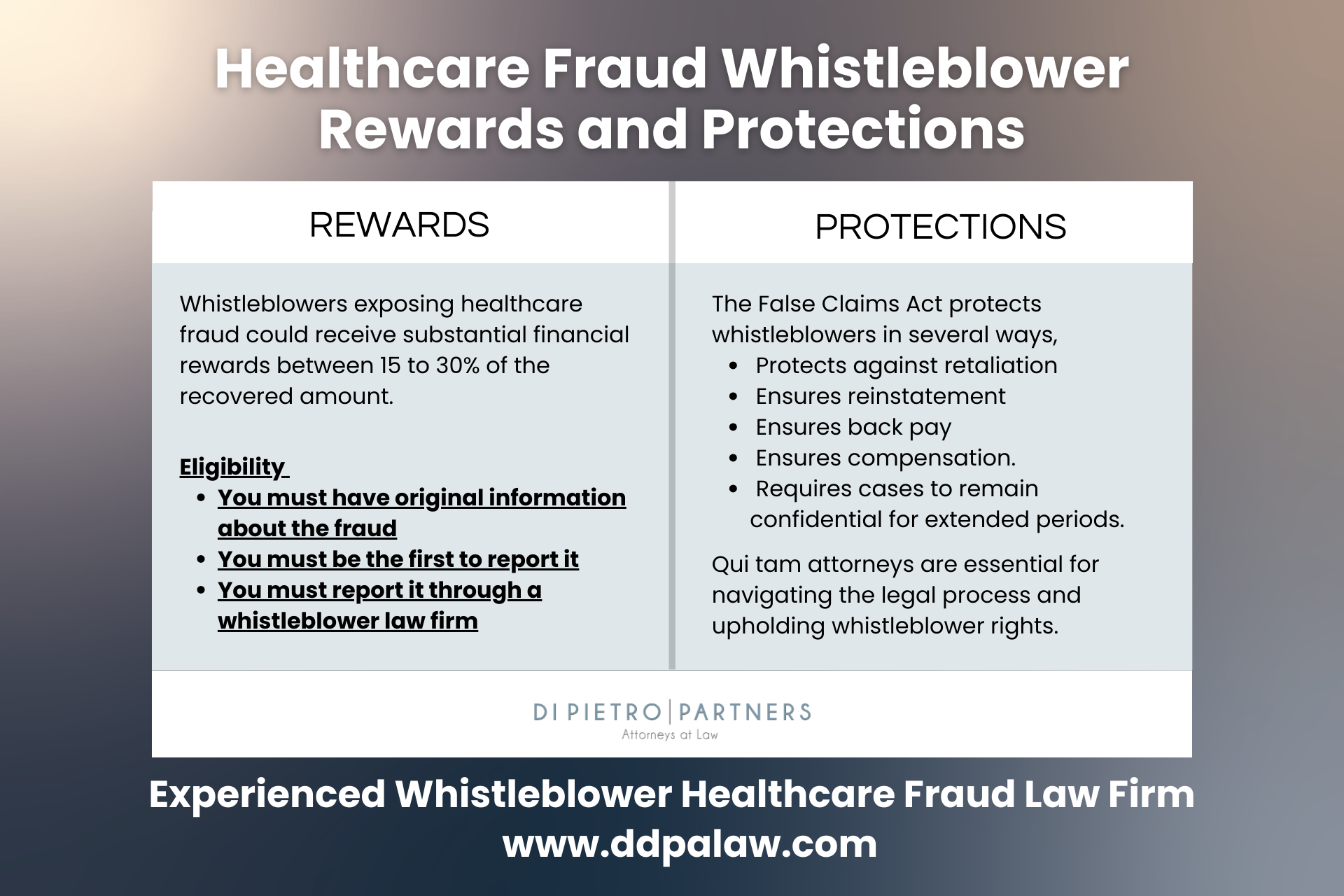Qui Tam attorneys specialize in cases filed under the False Claims Act (FCA). An expert Qui Tam attorney has extensive experience in complex negotiations, healthcare fraud, defense fraud, financial misconduct, regulatory law, civil litigation, and previous experience in government agencies. Additionally, a deep knowledge of whistleblower protections and solid investigative skills remains important.
Since the Qui Tam attorneys at Di Pietro Partners have the vital experience and expertise necessary to navigate complex healthcare fraud cases, call the office for guidance if you feel you have a case.
What is Qui Tam?

Qui tam lawsuits are legal actions in which a private individual acting as whistleblower, sues on behalf of the government to recover funds that have been obtained through fraud or other illicit activities against the government. The term “qui tam” is derived from a longer Latin phrase “qui tam pro domino rege quam pro se ipso in hac parte sequitur,” which means “he who sues for the king as well as for himself.”
These lawsuits are most commonly filed under the False Claims Act, a federal law that allows whistleblowers to expose fraud involving government programs like Medicare, Medicaid, and military contracts. If the lawsuit is successful, the whistleblower may receive a portion of the government’s recovery. (generally between 15-30 percent). Qui tam actions play a crucial role in deterring fraud, protecting taxpayer dollars, and holding individuals and organizations accountable.
When Would I Need a Qui Tam Attorney?
Anyone with credible information regarding fraud against the government may file a Qui Tam lawsuit. Due to the complex nature of these cases, you will need an attorney’s assistance. The following situations may warrant hiring an attorney:
- You have insider knowledge of billing fraud using government contracts or programs such as Medicare or Medicaid. This includes overbilling, kickbacks, billing for services not administered, and others.
- Perhaps you need legal advice regarding a possible fraudulent situation at work. Other times you may have seen fraudulent billing without being an employee. An attorney may offer advice on the situation.
- If you decide to become a whistleblower and expose fraud, you will need an attorney to safeguard your rights. Perhaps, you fear retaliation.
- You want to maximize your financial reward for exposing fraud. Under the FCA’s Qui Tam provisions you are entitled to a percentage of the recovered funds.
- You are accused of violating the FCA and you are innocent.
False Claims Act Violations
The False Claims Act (FCA) and Qui Tam provisions are closely related. The FCA is the federal law that prohibits filing false claims for payment to the government. Qui Tam is the legal mechanism that allows private citizens to act as “whistleblowers” and file lawsuits on behalf of the government. In other words, everyday citizens represent the government against those committing fraud. Examples of false claims violations may include:
- Healthcare fraud– Billing government programs for services not received. This does not include a billing error made by a clerk on one or two occasions. The government looks for a pattern of code changes and fake billing.
- Pharmaceutical fraud – Any kickbacks to doctors for prescribing drugs to patients on government healthcare programs is fraud. Prescribing unnecessary drugs is also fraud.
- Medical device fraud – Billing for devices never received or knowingly distributing faulty equipment is fraud.
- Defense Contractor fraud- Any contractor with government contracts may not engage in fraudulent activities. In other words, no charging for a more expensive item and delivering a cheaper one. Also, no substandard materials should be used in construction projects.
- Grant Monies – Universities and research facilities must use grant monies for the intended purpose. Also, no data should be falsified to continue receiving grant money.
How Can Our Experienced Qui Tam Attorneys Help?
First, we will listen and examine the situation. If you have a provable case, we will advise you on the next steps to take. Throughout the entire process, your silence is extremely important. Remember the following:
- Qui Tam whistleblowers are entitled to protection from retaliation.
- You may receive financial compensation for exposing this crime.
- Listen to your attorney and call if you have any questions.
- Collect any necessary documents according to your attorney’s directions. Do not do this without legal advice.

Understanding the False Claims Act
The False Claims Act (31 U.S.C. §§ 3729-3733) authorizes individuals to file lawsuits against entities or persons believed to have defrauded the U.S. government. Often referred to as “Qui Tam” actions, these lawsuits empower ordinary citizens, acting as “Relators,” to bring alleged wrongdoers to justice. Some state and local jurisdictions have parallel laws allowing for similar actions on their behalf.
The individual who brings forth such a claim is known as a “whistleblower.” While many whistleblowers are employees of the alleged fraudulent company, the Act doesn’t restrict the filing party to employees. Anyone with credible information, be it patients, subcontractors, or even competitors, can initiate a qui tam action.
When a whistleblower files under the False Claims Act, they might receive a share of the recovered funds, typically ranging from 15% to 30%. All claims filed are first presented discreetly to the government, shielded from the public eye. This confidential status, known as being “under seal,” ensures even the accused remains unaware of the ongoing investigation.
Upon receiving the claim, the Attorney General has a 60-day window, extendable upon request, to decide the government’s role in the litigation. If the government opts to intervene, they take the reins, collaborating with the whistleblower and their counsel.
False Claims Act Provisions
The False Claims Act (FCA) is a federal law that imposes liability on individuals and organizations that knowingly submit false or fraudulent claims for payment to the United States government. Originally enacted in 1863, the law has since been strengthened to encourage whistleblower involvement and increase accountability for fraud.
Key provisions of the FCA include:
Liability for False Claims – The FCA makes it illegal to knowingly submit, or cause to be submitted, a false or fraudulent claim for payment or approval. This includes billing for services not provided, falsifying records, or misrepresenting compliance with contract terms or regulations.
Qui Tam Provision – The law allows private individuals, known as relators or whistleblowers, to file lawsuits on behalf of the federal government. These are known as qui tam actions. If the government recovers funds, the whistleblower may receive 15 to 30 percent of the total recovery.
Treble Damages and Civil Penalties – Defendants found liable under the FCA may be required to pay three times the amount of damages sustained by the government, plus civil penalties ranging from approximately $13,000 to $27,000 per false claim (adjusted periodically for inflation).
Anti-Retaliation Protection – The FCA protects whistleblowers from retaliation by their employer. This includes protection against termination, demotion, harassment, or discrimination for lawful acts done in furtherance of a qui tam action. If retaliation occurs, the whistleblower may be entitled to reinstatement, double back pay, and compensation for damages.
Government Intervention – Once a qui tam lawsuit is filed, it remains sealed while the Department of Justice investigates. The government may choose to intervene and take over the case or decline to intervene, in which case the relator can proceed independently.
Statute of Limitations – Claims under the FCA must generally be filed within six years of the violation or within three years of the government becoming aware of the violation, but not more than ten years after the violation occurred.
Navigating a Declined Qui Tam Action
Navigating a Declined Qui Tam Action
Should the government decline participation, the whistleblower, with their attorney’s assistance, has the green light to proceed independently. If you’re contemplating filing a claim, especially against an employer, it’s reassuring to know the False Claims Act shields whistleblowers from workplace retaliation.
Potential whistleblowers should act swiftly. The presented information must be fresh and not public knowledge, unless the whistleblower is the primary source. Moreover, the first individual to highlight a specific fraudulent activity via a qui tam lawsuit has exclusive rights to do so. And remember, there’s a ticking clock: the Act typically has a statute of limitations, often six years. Don’t hesitate.
Qui Tam’s Roots
Derived from the Latin phrase “qui tam pro domino rege quam pro se ipso in hac parte sequitur,” qui tam translates to “he who sues for the king as well as for himself.” This mechanism, allowing private individuals to sue on the state’s behalf, has roots in medieval England. However, in the context of the U.S., it became prominently associated with the False Claims Act (FCA) during the Civil War. As war suppliers took advantage of the chaotic situation, overcharging and underdelivering, the FCA was instituted to curb these fraudulent practices. Now, it has evolved into a critical defense against deceit in any government-funded program.
How Does Qui Tam Work in Practice?
The sequence of a qui tam lawsuit is quite distinct:
- Initiation: An insider, privy to some form of deceit against the government, acts as a whistleblower or “relator.” This individual then files a lawsuit under the FCA.
- Under the Seal: This step is pivotal for confidentiality. Upon filing, the lawsuit remains “under seal” (or secret) for 60 days. This window allows the government to probe the allegations without public or defendant knowledge.
- Government’s Choice: After investigations, the government may decide to “intervene” or join the lawsuit. If it opts out, the whistleblower can proceed independently.
- Outcome and Rewards: Successful qui tam lawsuits result in financial penalties for the offending parties. The whistleblower, for their pivotal role, is entitled to a fraction of the recuperated funds, typically ranging from 15% to 30% depending on various factors, including whether the government intervened.
The Importance of Qui Tam Lawsuits
Qui tam actions are not just legal procedures; they’re linchpins of transparency and accountability:
- Public Fund Protection: They help recover funds that might otherwise be siphoned off through fraudulent activities.
- Whistleblower Empowerment: By providing potential monetary rewards and whistleblower protections, qui tam actions encourage those in-the-know to step forward.
- Deterrent Effect: The mere potential of a qui tam action can deter businesses from attempting to defraud the government.
Challenges and Considerations
Of course, like all legal mechanisms, qui tam lawsuits are not without complexities. There’s ongoing debate regarding the motivations behind such suits. While many are genuine attempts to rectify wrongs, there’s potential for misuse given the financial incentives. Additionally, companies can face significant reputational and financial repercussions, even if the claims against them prove unfounded.
Whistleblowers themselves may also encounter challenges. Filing a qui tam action requires detailed, non-public information and adherence to strict legal procedures. If the Department of Justice declines to intervene, the whistleblower must decide whether to proceed alone. This can be risky and costly without experienced legal support. Retaliation from employers is another concern, though the False Claims Act includes provisions to protect whistleblowers from adverse employment actions such as demotion, harassment, or termination.
Despite these challenges, qui tam lawsuits remain one of the most effective tools for uncovering systemic fraud against the government. Success often hinges on the quality of evidence, the whistleblower’s credibility, and the guidance of a knowledgeable attorney.